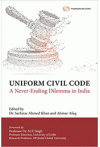- Author(s): Sarfaraz Ahmed Khan, Ahmar Afaq
- Publisher: Thomson Reuters
- Edition: 1 Ed 2021
- ISBN 13 9789390673940
- Approx. Pages 266 + Contents
- Format Paperback
- Approx. Product Size 24 x 16 cms
- Delivery Time 3-5 working days (within Kerala & South India) (Others 7-9 days)
- Shipping Charge Extra (see Shopping Cart)
............................................................................................
Description
Uniform Civil Code is a compilation of essays by experts on one of the most debatable topics of independent India. In the Indian legal system religious personal laws exist along with territorial secular laws-an understanding borrowed from British India. This understanding is often criticized because religious personal laws are considered to be gender unjust and a hurdle in realizing the goal of national integration. Being a secular nation, India has, time and again, strived to settle these issues without much success. A Uniform Civil Code is often suggested as a remedy but the question lingers: will its introduction resolve all the problems pertaining to gender equality and national integration? Or will it have an adverse impact on the religious rights of the citizens? Uniform Civil Code is an attempt to answer all such questions by exploring various facets of the topic. Readers will get an insight into the journey and evolution of the concept of Uniform Civil Code as also the views of the protagonists and antagonists. From the Constituent Assembly debates, corridors of the courts of law, and political agendas being set on roads and TV studios, this book will give readers an overall insight into the topic and allow them to decide what seems right in their perspective.
.........................................................................................
Contents
Part I - UCC: Historical Background and Concept
Chapter 01 : Multiculturalism and Spirit of Accommodation: A Relook at the UCC Debates
Chapter 02 : Uniform Civil Code: Its Vision through Indian constitution
Chapter 03 : Analysis on Constituent Assembly Debate on Uniform Civil Code
Chapter 04 : Constituent Assembly Debates on Uniform Civil Code
Part II - UCC: Need and Relevance
Chapter 05 : Uniform Civil Code vis-a-vis Personal Laws
Chapter 06 : Feasibility of Uniform Civil code for societal need and human rights of women
Chapter 07 : From Hindu code bill to uniform civil code: An Unfinished Journey
Chapter 08 : Examining matrimonial personal laws in India from a lens of feminist Jurisprudence:
The need for an uniform civil code
Chapter 09 : Right to maintenance for women from the lens of uniform civil code: Issues and Perspectives
Part III - UCC: issues and Challenges
Chapter 10 : A critical appraisal of uniform civil code with special emphasis on contemporary issues
Chapter 11 : Muslims, Gender Justice and the politics of uniform civil code
Chapter 12 : India needs a voluntary civil code and not a uniform civil code
Chapter 13 : Uniform civil code: The regional challenge with special reference to the North-Eastern India
Chapter 14 : Equality and freedom with a difference
Notes on Contributors
Index
............................................................................................
Author Details
DR. SARFARAZ AHMED KHAN, LLM and MPhil (NUJS), LLM (Essex, UK), PhD (CityU, Hong Kong), is a faculty member of the West Bengal National University of Juridical Sciences (WBNUJS) and former Professor and Director of Symbiosis Law School, Hyderabad, a constituent of Symbiosis International (Deemed University), Pune. Dr. Khan was awarded the British Chevening Scholarship to pursue his LLM from the University of Essex, the Hong Kong UGC Scholarship to pursue his PhD at the City University of Hong Kong, the Michigan Grotius Research Fellowship from Michigan Law School, USA, and the International Visitors Leadership Programme Fellowship of the US Department of State. He has authored several books including Transnational Sex Trafficking: An Integrated Reparation Model.
AHMAR AFAQ is an Assistant Professor at Symbiosis Law School, Nagpur. He has nearly six years of teaching experience at some of the premium law colleges such as Symbiosis Law School (SLS), Hyderabad, and Aligarh Muslim University. He was the founder head of the Centre for Human Rights at SLS, Hyderabad. Afaq's areas of interest are Family Law, Human Rights and National Security Laws. Apart from teaching, his passion spills into areas of research. He has authored four books and contributed research articles in some of the well-known national and international journals. He is also working as an editor in various reputed journals and has conducted numerous lectures and seminars on varied topics. Afaq has played a significant role in research projects conducted by the Edinboro University, USA, on Rohingya Refugees and by the Tribal Research Centre, Tamil Nadu, on the cultural practices of the Nilgiris Tribes.

